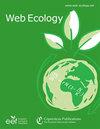Validating the use of non-invasively sourced DNA for population genetic studies using pedigree data
IF 2.4
3区 环境科学与生态学
Q2 ECOLOGY
引用次数: 4
Abstract
Abstract. Non-invasive genetic sampling has provided valuable ecological data for many species – data which may have been unobtainable using invasive sampling methods. However, DNA obtained non-invasively may be prone to increased levels of amplification failure and genotyping error. Utilizing genotype data from 32 pedigreed koalas, this study aimed to validate the reliability of final consensus genotypes obtained using DNA isolated from koala scats. Pedigree analysis, duplicate genotyping, analysis of mismatched loci and tests for null alleles were used to look for evidence of errors. All genetically confirmed parent–offspring relationships were found to follow Mendelian rules of inheritance. Duplicate genotypes matched in all cases and there was no evidence of null alleles. Related individuals always had different 12-marker genotypes having a minimum of three unique loci (in one full sibling pair), a mode of seven unique loci and a maximum of 11 unique loci. This study demonstrates the capacity of DNA recovered from koala scats to provide reliable genotypes that can unequivocally discriminate individuals and infer parentage, provided data are missing from no more than two loci. Validating data obtained using non-invasive sampling is an important step, allowing potential problems to be identified at an early stage.使用系谱数据验证非侵入性来源DNA用于群体遗传研究
摘要非侵入性遗传采样为许多物种提供了宝贵的生态数据,这些数据可能是使用侵入性采样方法无法获得的。然而,非侵入性获得的DNA可能容易增加扩增失败和基因分型错误的水平。利用32只纯种考拉的基因型数据,本研究旨在验证从考拉粪便中分离DNA获得的最终共识基因型的可靠性。使用系谱分析、重复基因分型、错配位点分析和零等位基因检测来寻找错误的证据。所有基因证实的亲子关系都遵循孟德尔遗传规则。重复基因型在所有病例中都匹配,没有证据表明存在零等位基因。亲缘个体总是具有不同的12标记基因型,至少有3个独特的基因座(在一个完整的兄弟姐妹对中),模式为7个独特的基因座,最多11个独特的基因座。这项研究证明,从考拉粪便中提取的DNA能够提供可靠的基因型,可以明确区分个体并推断亲子关系,前提是数据缺失不超过两个位点。验证使用非侵入性采样获得的数据是一个重要步骤,允许在早期阶段识别潜在问题。
本文章由计算机程序翻译,如有差异,请以英文原文为准。
求助全文
约1分钟内获得全文
求助全文
来源期刊

Web Ecology
Agricultural and Biological Sciences-Ecology, Evolution, Behavior and Systematics
CiteScore
4.60
自引率
0.00%
发文量
6
审稿时长
17 weeks
期刊介绍:
Web Ecology (WE) is an open-access journal issued by the European Ecological Federation (EEF) representing the ecological societies within Europe and associated members. Its special value is to serve as a publication forum for national ecological societies that do not maintain their own society journal. Web Ecology publishes papers from all fields of ecology without any geographic restriction. It is a forum to communicate results of experimental, theoretical, and descriptive studies of general interest to an international audience. Original contributions, short communications, and reviews on ecological research on all kinds of organisms and ecosystems are welcome as well as papers that express emerging ideas and concepts with a sound scientific background.
 求助内容:
求助内容: 应助结果提醒方式:
应助结果提醒方式:


